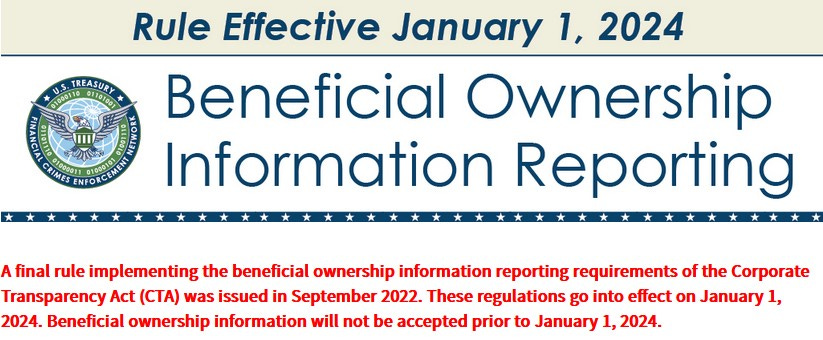
The Corporate Transparency Act (CTA), which was signed into law on January 1, 2022, is set to go into full effect on January 1, 2024.
This landmark legislation is poised to bring significant changes to the business landscape, with a particular focus on Limited Liability Companies (LLCs).
Here’s what LLCs should prepare for as the CTA’s implementation date approaches.
1. Reporting Requirements: One of the key provisions of the CTA is the requirement for LLCs and other covered entities to report certain information about their beneficial owners. This includes disclosing names, addresses, dates of birth, and other identifying details. LLCs should begin gathering this information to ensure compliance with the new reporting requirements.
2. Beneficial Ownership: LLCs must identify and report anyone who owns, controls, or receives substantial economic benefits from the company. Understanding who qualifies as a beneficial owner and maintaining accurate records will be crucial.
3. Enhanced Due Diligence: Expect increased scrutiny as financial institutions and law enforcement agencies will have access to the reported information. LLCs should be prepared for more thorough due diligence checks when conducting financial transactions or opening bank accounts.
4. Penalties for Non-Compliance: The CTA carries substantial penalties for non-compliance, including fines and even criminal charges. LLCs should ensure they are aware of their obligations and meet all reporting deadlines.
5. Seek Legal and Financial Guidance: Given the complexity of the CTA, it’s advisable for LLCs to consult legal and financial professionals who can provide guidance on compliance and potential impacts on their businesses.

Landmark Controversy
The 2022 Corporate Transparency Act (CTA) has sparked significant controversy since its enactment.
This legislation, which aims to enhance transparency and combat money laundering, has generated mixed reactions and debates. Here’s a summary of the key controversies surrounding the CTA:
- Privacy Concerns: One major controversy revolves around privacy. Critics argue that the CTA’s requirement for companies to disclose information about their beneficial owners could infringe upon individuals’ privacy rights. They express concerns that sensitive personal information will be exposed, potentially leading to privacy breaches and identity theft.
- Impact on Small Businesses: Small businesses have voiced concerns about the administrative burden and costs associated with compliance. They argue that the reporting requirements may be particularly challenging for smaller enterprises with limited resources.
- Effectiveness in Combatting Money Laundering: Some experts question whether the CTA will effectively achieve its goal of combating money laundering. They argue that determined criminals may find ways to circumvent the regulations, making the Act less impactful than intended.
- Legal Challenges: Legal challenges to the CTA have emerged, with some arguing that it could be unconstitutional. These challenges often center on issues related to privacy, the scope of government authority, and potential conflicts with existing laws.
- Impact on Financial Institutions: Financial institutions will play a crucial role in implementing the CTA. They face challenges in verifying the information provided by covered entities and ensuring compliance, which has raised concerns about the Act’s practicality and effectiveness.
- Global Implications: The CTA’s extraterritorial reach has also stirred controversy. Foreign companies with U.S. operations must comply, raising questions about jurisdiction and international legal implications.
The 2022 Corporate Transparency Act has generated controversy primarily due to concerns about privacy, its impact on small businesses, questions about its effectiveness, legal challenges, challenges for financial institutions, and its global implications. These controversies reflect the complexity and significance of the Act’s provisions and their potential ramifications.
As the implementation date of the Corporate Transparency Act draws nearer, small businesses and LLCs should take proactive steps to ensure they are prepared for the changes it brings.
Compliance is not only a legal requirement but also an opportunity to demonstrate transparency to the public and trustworthiness in the business world.

